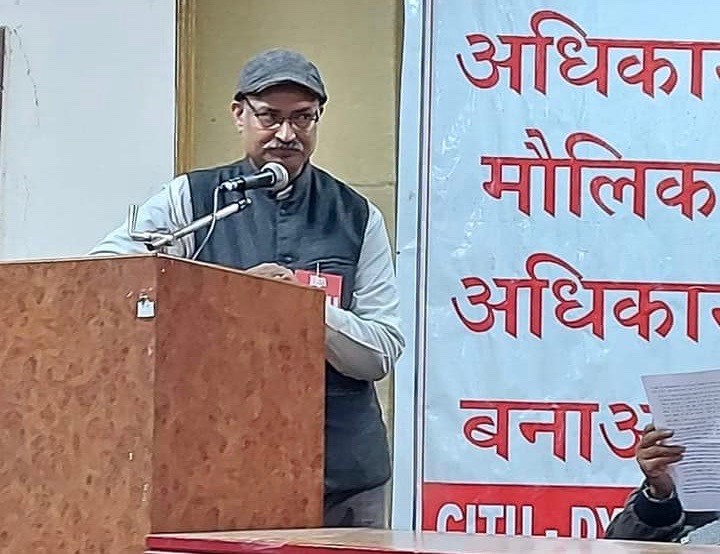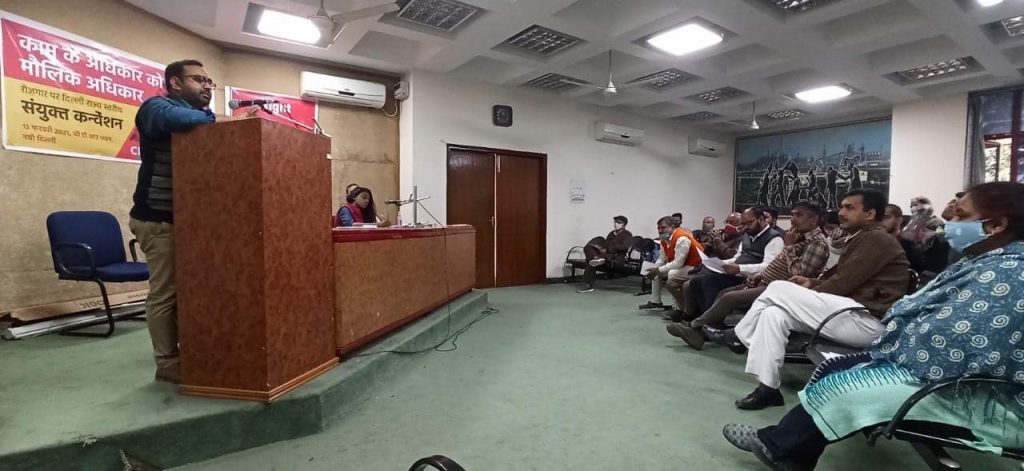“Declare the Right to Work as a Fundamental Right” was the slogan under which a joint convention on unemployment and deteriorating quality of employment was organized on February 13, by the Delhi state committees of the Centre of Indian Trade Unions (CITU), the Democratic Youth Federation of India (DYFI) and the Student Federation of India (SFI).
At this convention, held in CITU’s head office, with police stationed outside, the delegates from the three organizations took a unanimous decision to launch a sustained campaign across the national capital region beginning on February 21 to press the central and the state government to declare a ‘national unemployment emergency’.
Signatures collected in support of the 18 demands presented at the convention will be submitted to all the District Magistrates as a part of this campaign, which will culminate into a demonstration in March.
Among the crucial demands is the legislation of the Bhagat Singh National Urban Employment Guarantee Act (BNUEGA), guaranteeing 200 days of employment, at no less than a minimum wage of Rs. 21,000 (USD $289). All job-seekers in the city, to whom the government fails to provide meaningful jobs, should be eligible for an unemployment allowance of at least Rs. 5,000 per month.
“Unemployment is inherent in the very system of capitalism,” Tapan Sen, all-India General Secretary of CITU and former Rajya Sabha member, said in his inaugural address. “It is necessary to transcend capitalism in order to have full employment. However, even within this system, if we have the Right to Work declared as a fundamental constitutional right, it amounts to a major policy reversal.”
‘Narendra Modi government can be forced to retreat’
The Mahatma Gandhi National Rural Employment Guarantee Act (MGNREGA), passed by the Indian National Congress (INC) under the pressure of the left forces in 2005 to guarantee at least 100 days of work to one person per family in rural India, “is against the basic understanding of capitalism,” Sen argued.
“However, it was still possible to have it legislated because of the correlation of political and social forces at the time.. It meant a retreat by Dr. Manmohan Singh’s government. And it played an important role in rural India. Based on this experience we are demanding that a similar act should also be implemented for the urban areas.”
He insisted that a similar retreat can be forced upon Narendra Modi’s far-right BJP-led government in the present situation where the Labor Force Participation rate, which has been declining for a decade, has reached a nadir of a little over 40% as of December 2020. This figure, which provides the ratio of total people employed in jobs and the total working age population, implies that almost 60% of the workforce is not employed.
Demands are informed by historic precedents
“The concept that every working age person has a right to work – and where the government fails to provide any such person with a job, it is obliged to compensate him through some form of unemployment allowance – is not a ‘utopian dream,” reiterated Anurag Saxena, the Delhi General Secretary of CITU.

He added that such a policy has historical precedent in the Soviet Union and Eastern European countries in the bloc, which had succeeded in providing nearly full-employment to its working age population.
The demand for reduction of maximum working hours limit from the current 48 hours per week to 35 is also informed by the concept of work-sharing in these countries, where working hours were controlled to ensure the maintenance of high employment, despite technological advances reducing labor requirement.
Anurag urged the cadres who will be working on this campaign to study and understand the contrast between the tall promises of Skill India, Make in India and a plethora other such schemes introduced by this government, and the lack of results they have to show on ground.
The clarity emerging from this understanding, he said, is necessary to be able to confidently campaign in the current atmosphere, in the backdrop of ongoing farmers’ protest, when raising the demand for employment is likely to be declared as an act of terrorism. “But all the figures we are quoting in our campaign are those put up by the government bodies,” he said.
“We are told, instead of seeking jobs from the government, we should start a shop so that instead of asking for a job, we can give jobs to two other people,” Pritish Menon, Delhi state Secretary of SFI, said while addressing the convention.

“The BJP is actually conducting campaigns in localities to propagate such ideas. The middle class,” he argued, is given the example of crony capitalists like Adani and Ambani, and made to believe that they can also rise from ‘rags to riches’.
But this misleading direction is the very “politics of capitalism”, he added, stressing that it is necessary to counter the illusions created by such narratives by placing before the students the reality of the prospects faced by the educated youth entering the job market.
‘A militant campaign in Delhi will have an impact all over the country’
Highlighting the challenges and the advantages of initiating in Delhi this campaign, which was launched by the national convention presided by the national leadership of the three organizations on February 2, Sanjeev Kumar, Delhi Secretary of the DYFI, said, “Workers from all over the country reside here. Students from all over the country study here. They hail from families across the country. A militant campaign here will have an impact all over the country.”

He also added, the very demography of Delhi means that the leading cadres in the campaign will have to understand the nuances of the language and the sensibilities of the people from the neighboring states of Uttar Pradesh, Bihar, Haryana etc. “Only then can we properly articulate our demands and raise the correct slogans with which the population will be able to connect emotionally,” he said.
While the historic levels of unemployment, increasing hunger, repression etc., provides all the objective factors necessary to launch a militant struggle, one should not assume there will be an automatic revolt by the population, cautioned Sunand, a member of CITU’s Delhi state committee.
“The BJP is also actively campaigning with the propaganda that ‘if you don’t have food, it is because the Muslims are eating them all. If you don’t have jobs, it is because the Muslims have taken them all. The corporate media is used to bombard people with such propaganda everyday. These,” he said, “are the subjective factors which will challenge us while campaigning on the ground.”
“Objectively, yes, there is a crisis. But whether or not there will be a revolt against it will be determined by a number of subjective factors, the most important of which is organization.”





